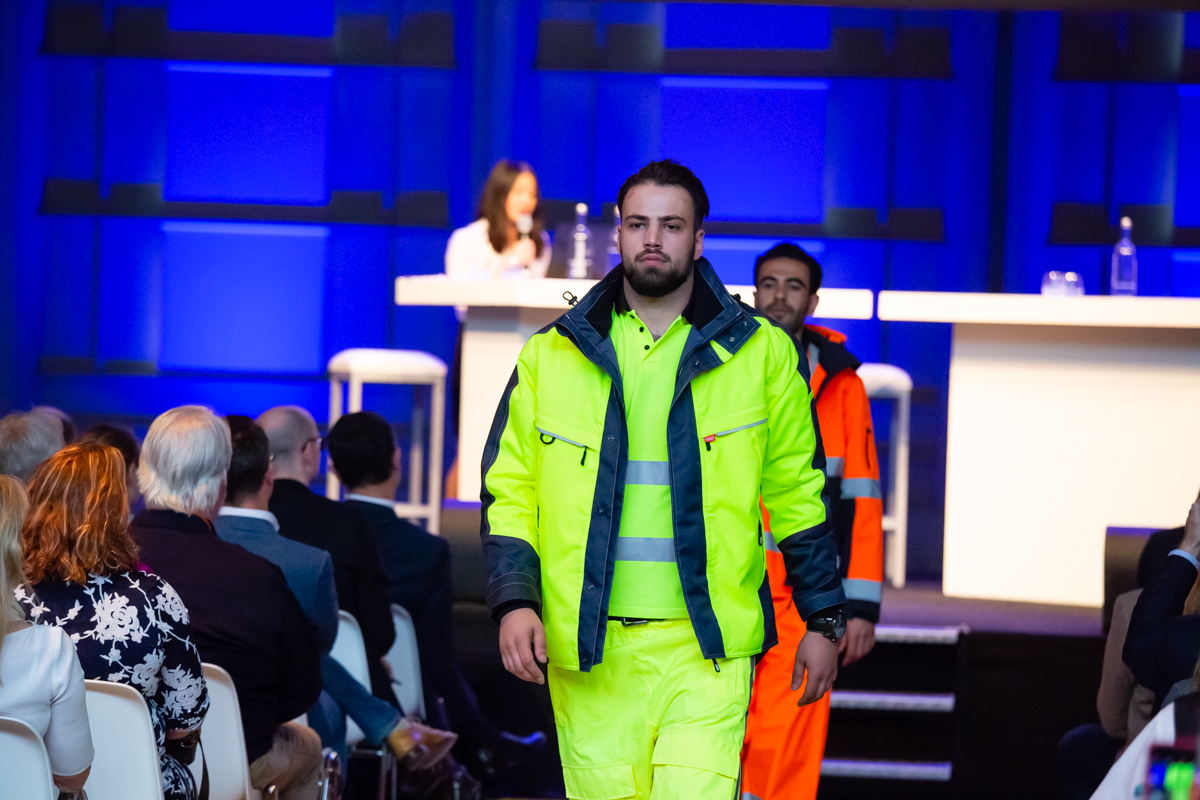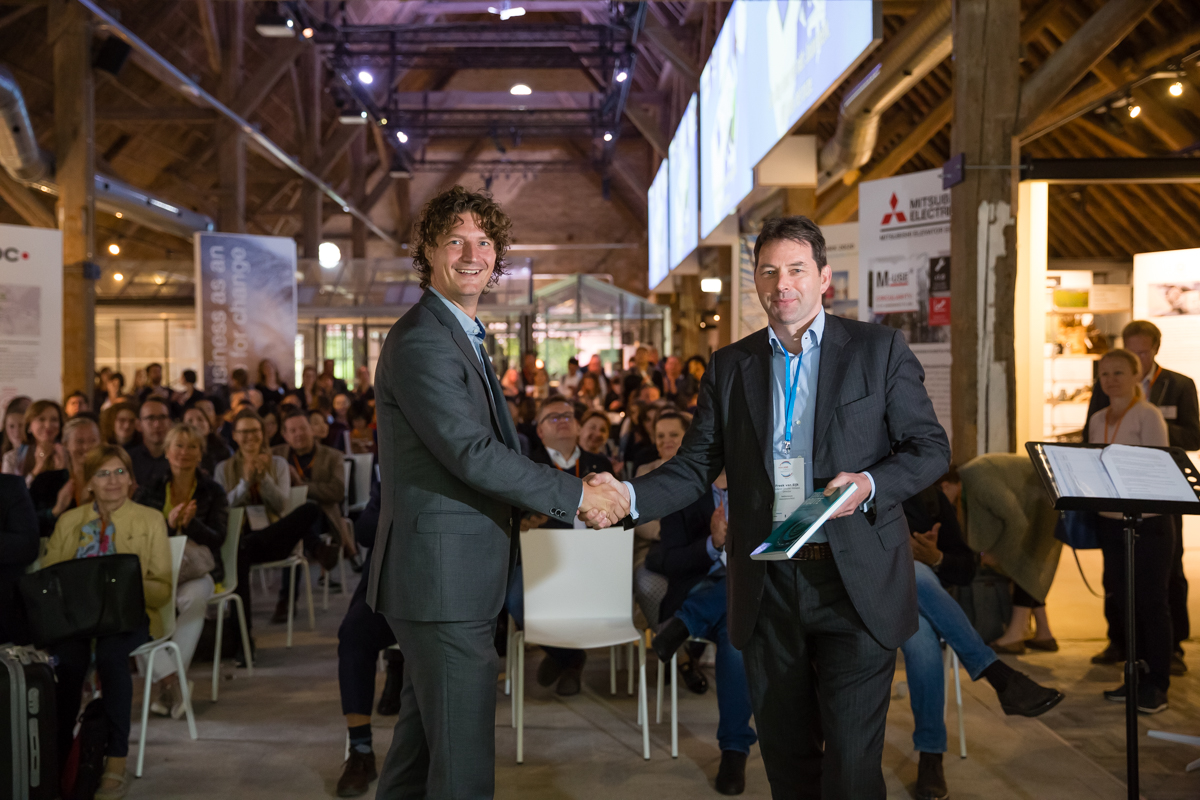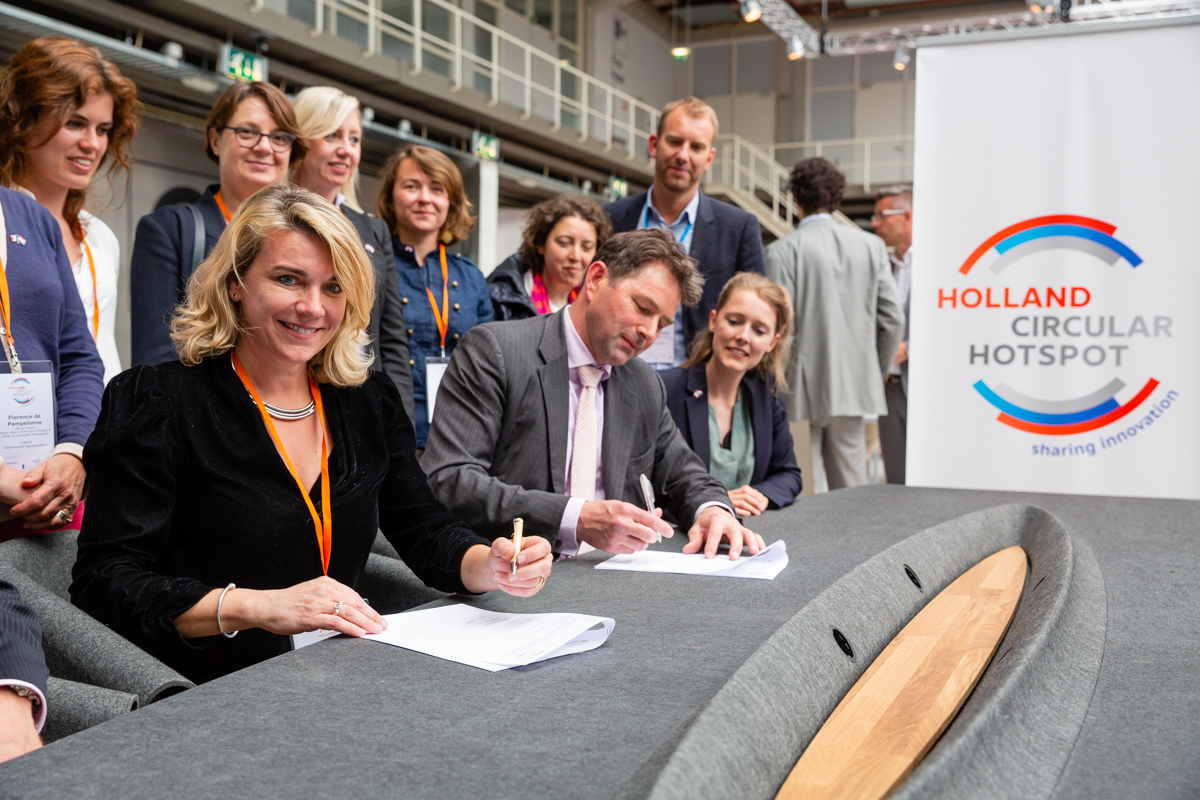Impressions Holland Circular Economy Week
by Freek van Eijk, director Holland Circular Hotspot
Living in a densely populated delta below sea level, the Dutch were forced over centuries to develop extensive knowledge and experience in finding high quality, sustainable and affordable solutions to protect delta areas and enable delta life. The Netherlands is now one of the regions in the world where the circular economy is leaving the conceptual phase and taking of. Their history with water turned Holland in a living lab and Circular Hotspot. The Dutch hope that their innovations can be adapted as solutions for global challenges everywhere. They know they cannot do it alone and that is why they set up the Holland Circular Economy Week (HCEW2018). Altogether over 500 persons attended this week, coming from more than 20 countries. It was a wonderful mix of Industry, government bodies, knowledge Institutes and NGO’s. The new Holland Circular Hotspot foundation together with the Ministry of Infrastructure & Water Management, The Netherlands Enterprise Agency, Rijkswaterstaat and supported by Rabobank, Philips, Renewi and the C&A Foundation, had set up an impressive 4 day programme.
Day 1: Welcome reception with Dutch Secretary of State Van Veldhoven
The welcome reception for the foreign delegation at the Peace Palace was a symbolic start. General Director Erik de Baedts explained that working on Circular Economy (CE) is not only a very sensible thing to do from both economic and environmental sense but will also contribute toward the objectives of the Peace Palace. If we create more jobs, if we can feed the world, if use resources much better, if we preserve natural capital and give equal opportunities to the next generations the likelihood of peace is far greater.
The strongly commited Dutch Secretary of State for Infrastructure and Watermanagement Stientje van Veldhoven gave a glimpse of upcoming measures of the Dutch government towards more circularity. She said to be happy with the recent EU proposal aimed at fighting single use plastics and didn’t want to wait finalisation but start a Dutch Pact geared at plastic cutlery, straw and cups. She furthermore hinted at extending extended producer responsibility for example for clothing, furniture and disposables. Eco-design, knowledge exchange and international collaboration were highlighted by the Secretary of State as crucial elements in the circular transition.
Day 2: Holland Circular Economy Conference
On June 12, a conference attended by 400 persons took place in the revitalized Fokker Terminal in The Hague. Thought leaders like architect Thomas Rau, former prime minister Jan Peter Balkenende, CEO Harald Friedl from Circle Economy and front runners from Industry, both small and big shared insights and lessons. Jacqueline Cramer moderated the conference with passion and skill.
- “The real challenge is not Climate Change but Mind Change” (Thomas Rau)
- “CE is all about collaboration in the value chain and together closing the loop” (Bas Blom, Renewi)
- You can’t just copy circular idea’s, you have to adapt them to your local situation (Ladeja Godina Kosir, Circular Change)
- “In 2020 25% of our turnover will be circular” (Hans de Jong, President of Philips Netherlands)
We have seen the strong government support and personal involvement from Secretary of State Stientje van Veldhoven. Mrs van Veldhoven was in fact speaking for all members of the Dutch government when it comes to the Dutch ambitions to become fully circular in 2050.
A CE doesn’t come by itself. In the workshops the Dutch showed their interventions, insights and tools to come to a Circular Economy. Not to preach but to learn from the other countries and exchange ideas how private companies, government, scientist, NGO’s can work together to accelerate CE all over the world.
- We learned from TNO that CE is not only about resources but is a very efficient way to contribute significantly to the Climate goals.
- Drift made clear that CE is a system change and illustrated it with a roadmap for the fashion industry.
- Accenture presented the latest insights on business models (way beyond waste management) and the audience received practical insight on where and how to start from Professor Jan Jonker as well. Professor Jan Jonker gracefully shared the workbook “Organising for the Circular Economy”, a workbook for developing Circular Business Models.
- Circo showed us what we can and should do in the very beginning, the design phase. In the design phase probably 80% of the life time environmental footprint is determined.
- Social Enterprise Circle Economy brought the transition to a CE to the local level, with a Toolkit for implementing CE in Cities.
- Schiphol Area Development Company showed the power of Public Private Partnership for scaling up circular economy in a region.
- Both good and bad Dutch experiences when implementing Extended Producer Responsibility for Packaging and WEEE were shared by Afvalfonds Verpakkingen and WeCycle. Packaging and WEEE are crucial flows everywhere in the world.
- Rabobank and Sustainable Finance Lab touched the subject of financing the CE. “Money makes the world go round” but the transition from a linear to a circular world actually brings significant financing challenges …but also huge opportunities.
- We have seen what governments can do for examples by bringing stakeholders together in a new innovative PPP, the so called Dutch Green Deals or by giving the example by circular public procurement, good for 10 to 20% of GDP.
- Milieu Centraal and the University of Groningen touched the relatively new circular topic of “how to make consumer behavior more sustainable”. In the ends it all starts with us as an individual.
Guest enjoyed a circular fashion show where sustainable production is key at #HCEW2018organized by Dutch Awearness.

Day 3: Visiting tracks
On Wednesday, our foreign guests went on excursion to see circular economy in action. They engaged with entrepreneurs that walk the talk and shared their best practices, their passion but also their hard-learned lessons.
The organizer had selected six impactful themes and organized six bus-tours around biomass and food, plastics, electronics, building and construction, textile and water. On average each tour showcased three different circular business models. A video impression of the companies visited can be found here
During the HCEW2018 the latest circular literature was exchanged as well. In the inspirational setting of C-Beta Guido Braam, symbolically handed over the English translation of “Circular Route”, a roadmap for a circular business model to Freek van Eijk, CEO of Holland Circular Hotspot.

Day 4: Matchmaking Event
Also the second edition of magazine Circular is Going Global was launched. With over 40 new Dutch showcases it gives an impression of the diversity of sectors and parties involved to create circular solutions.
There is an urgency to act! A conservative estimate for Holland is that the seawater level will have risen one meter by the year 2100. The Dutch can cope, at a price. But now imagine that in 2050, 80% of world population will be living in a delta area. Can the world cope? We have to make CE actionable!
To make CE actionable a Match Making Day was organized by EEN in the Innovation Center of Rijkswaterstaat called LEF. Lef is Dutch for courage and guts. A quite appropriate name considering that the transition to a circular economy requires a system change, a breakthrough in thinking and acting patterns. The organisers were quite pleased with the number of appointments. In between sessions start-ups like Closing the Loop, Black Bear Carbon, SuperUse Studio’s, Phario, Iskraemeco, Zero Waste Scotland, Deko Eko, Greentom, Ecor and Access Material Exchange pitched their circular cases to the participants.
On Thursday June 14, at the closure of the Holland Circular Economy Week, Holland Circular Hotspot signed two Memoranda of Understanding. With four other European Circular Hotspots an agreement was made to continue and intensify cooperation. With the Taiwan Circular Economy Network (TCEN) a MoU was signed to exchange knowledge and tools and to work together on circular market opportunities. On Tuesday June 12 during the conference, Holland Circular Hotspot signed an agreement for cooperation with the French Orée. By working together the Hotspots hope to accelerate the transition to a circular economy both nationally and internationally. Also the companies Ecor and Eyelevel signed a Letter of Intent to work together on development of circulair retail products.

Let's continue to share circular innovations, co-create and cooperate.
As a note from the author: The Dutch are collaborating since the Middle Ages in the struggle against water. I believe they can truly brand the Netherlands as a Circular Hotspot or a Sustainable Urban Delta. Circular Economy and Smart and Sustainable City solutions can be just as powerful a label for Holland as Water Management but with a much higher market potential.
An event like this doesn’t happen by itself. It has been a tremendous teamwork from the Holland Circular Economy Week team and their public and private partners. They had aimed high, had the best imaginable audience one could hope for and even improved during execution. For more info, read the HCEW2018 Blog of the Holland Circular Economy Week 2018 or contact Holland Circular Hotspot at info@hollandcircularhotspot.nl.
The next event, this time organized by Zero Waste Scotland, will be Circular Economy Hotspot Scotland from October 30 to November 1, 2018. It is a good place to continue sharing circular innovations, co-create and cooperate.
